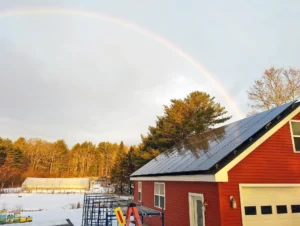
A rainbow leads to a Revision Energy rooftop solar installation in Brunswick, Maine (courtesy: ReVision Energy)
Fortunat Mueller believes 2024 could be the year of the electric vehicle. At least, he hopes so. He’s been waiting a really long time for proper charging infrastructure.
“I’ve been driving an EV since I was in college, so about 25 years,” Mueller recalls.
If you’re doing some mental math and wondering how that’s possible, let me interrupt and confirm your suspicion- no, there wasn’t really an EV market in the United States around the turn of the century.
That didn’t matter much to Mueller, who is not the kind of guy who waits for someone else to present a solution. Instead, as part of an independent senior engineering project at Brown in 1999, Mueller built an electric powertrain and Frankensteined it into a donated 1988 Volkswagon Jetta. Take a gander at this eye-catcher:

“I mean, it was not very nice,” Mueller laughs when considering his creation. “But I was an undergrad!”
A lot has changed since those pre-Y2K days. Most of us are no longer unknowingly downloading viruses to our family computers on Napster and electric vehicles have started to gain mass market adoption. Mueller finished school, had himself a Hall of Fame-worthy Ultimate (frisbee) career, and before hanging up his disc, co-founded the 100% employee-owned solar company ReVision Energy, where he and more than 400 like-minded co-owners work toward building a just and equitable electric future.
He still drives an electric car, albeit one made in a factory. Mueller wonders: Is the rest of America finally ready to live in the EV-friendly world he was ready to step into when he pushed his foot down on that go-kart jalopy?
“We’re seeing a lot of federal funding for it now,” Mueller notes. This could be his year!
“I’m very excited to start seeing real charging infrastructure,” he re-confirms with the slightest of Rose on the Titanic vibes.

Power to the people
ReVision Energy, which has offices in Maine, New Hampshire, and Massachusetts, has constructed nearly 20,000 solar installations across the Northeastern United States. The company turns 21 years old this year.
Perhaps a celebratory sudsy beverage is in order?
“We had a few beers, yeah,” jokes Mueller.
Outside of happy hours, ReVision builds sub-utility scale solar, usually maxing out at around 7 or 8 MW. They do a lot of residential, community, and commercial projects in addition to constructing charging infrastructure and some energy storage and heat pumps. Not the kind of big money, no whammies stuff that makes for eye-catching headlines, but the sort of work that makes a real, tangible difference in communities.

“We basically work with our residential customers to eliminate fossil fuels entirely from their lives,” ReVision’s president and co-founder beams. “We think that’s what’s going to happen to the whole economy, and we think homeowners should go first.”
That includes people who can’t install solar panels on their homes or businesses; a common roadblock for renters, condo owners, and those with irregular roofs in the Northeastern United States. ReVision’s Community Solar Farms (CSFs) promise residents of Maine and New Hampshire the full benefits of solar, regardless of their ability to put panels up, by buying shares in a solar farm constructed elsewhere.
“[Our model] tries to replicate the value proposition of rooftop solar as closely as possible for customers,” Mueller explains. “Customers actually buy and own a share of a community solar project.”
He prefers his company’s shared ownership model to the more common community solar subscription.

“I think of it as a difference between renting an apartment and owning a condo,” Mueller contends. “To some degree, it feels the same. You’ve got a place to live.”
But in the subscription model, Mueller argues, “There’s some savings on your electric bill, but you never own the thing. You basically trade one bill for a slightly lower bill. In our model, you are ultimately eliminating your electric bill- though you do have to make the capital investment.”
Most of ReVision Energy’s customers finance their projects with loans, conducting a similar sort of bill swap- an electric bill for a (hopefully) smaller loan payment.
“But unlike the subscription, the loan payment eventually goes away,” reminds Mueller. “And then you end up with the full benefit of the solar.”
ReVision is working to ensure clean energy is available to a broad group of customers, from championing solar projects in low-to-moderate-income (LMI) communities like a resident-owned mobile home park in New Hampshire, to supporting refugees and immigrants via solar-powered refrigeration.

The company’s co-owners also assist disadvantaged groups with writing grant proposals to fund LMI projects and ReVision advocates for legislation that makes LMI solar projects more accessible.
To Mueller, it’s all worth it. He recognizes distributed and rooftop solar as keystones of the clean energy transition.
“We’re not gonna build that much transmission and distribution,” ReVision’s president predicts. “We need a mix of small solar and big solar to get where we’re going.”
Generating the next generation
To get wherever we’re going- and hopefully, it’s not in the backseat of that Volskwagon Jetta- the renewable energy industry will have to overcome some major hurdles.
“The workforce and interconnection feel, to me, like the two biggest constraints,” Mueller points out.
If interconnection peaks your interest, I’ve got a mid-article advertisement for you!
The interconnection event GridTECH Connect Forum encourages collaboration between project developers, utilities, grid operators, regulators, and policymakers. Togethe
Read More

